- Home
- Ian McDonald
Ares Express dru-2 Page 27
Ares Express dru-2 Read online
Page 27
“She means, we don’t just take the word of sweet old ladies, no matter how good their juju is,” said Mishcondereya, glowing and scrubbed from a showering off all that nasty Molesworth grit. She towelled at her hair furiously, began the laborious task of reinserting all her jewellery.
“You see, my dear, your story about the hole in the middle of the line rang true, because it’s very far from being the first,” Seskinore said, pouring Grandmother Taal a glass of mint tea. He dropped in a sugar cube, pounded it with a glass rod, gave it three swirls. “My own trade secret. On the circuit, you learn the art of good tea.” It tasted no better than most others, worse certainly than Marya Stuard’s. He continued, “Bloody things’ve been popping up all over the place. Chryse, Tempe, Axidy. Even Grand Valley. Could be hundreds of the things out in the desert we never hear about. Little breakdowns in reality. Some of those orbital processors have been running constantly for well over a thousand years, so they’re bound to be showing the strain, and of course they skimp on the maintenance budget. Perfect opportunity for our friend up there to sneak in the back way.”
“Apart from that, we’ve been keeping an eye on Devastation Harx and his crew,” Weill said, feet up on a padded mound that served as a tea-table. “We keep an eye on most of the apocalyptic religions.”
“This Harx is an apocalypsist?” Grandmother Taal said, sitting primly on an uncomfortable banquette, boots buried up to the ankles in buff fluff.
“I think that’s what you’d call someone who advocates all-out war between humans and angels,” said Mishcondereya.
“So how did your misfortunate daughter become involved with such a disreputable villain?” Seskinore asked.
“My granddaughter did not take to an arranged marriage and ran away with a very common Waymender boy, who is also a member of this church,” Grandmother Taal said.
“I ran away and I did all right,” Weill said. “But then, I stayed well away from religions like any sane boy should. Especially ones you have to pay for.”
Mishcondereya flared her nostrils and gave a damp, disdainful flick of her still-wet hair.
“Not too bright, is she, your granddaughter?”
Before Grandmother Taal could riposte, Bladnoch’s sofa arm beeped. He bent close to the screen. Taal could make out neither the scratchy jerky images or the muttered words but something had come in on top of his sports channel, something that put furrows in his brow. Skerry was beside him. Grandmother Taal wondered if there might be something between the tall, thin man and the tough little woman.
“Trouble,” Skerry said. “Someone just took out three aerospacers on manoeuvres over Big Vermilion.”
“How?” Mishcondereya asked.
“Partacs,” Skerry said carefully.
“Oh,” said Seskinore. “So, either the angels have gone berserk up there…”
“Or Pastor Harx is cranking up his apocalypse machine,” Weill said.
Perked by the scent of action, Skerry leaped to her feet and pulled an anodised aluminium gosport horn down from the ceiling.
“Full speed ahead there!” she shouted to the engineers. On her word the Class 27 found power deep in its tokamaks and leaped forward, sending the United Artists reeling.
“Excuse me,” Grandmother Taal said, innately adjusting to the surge and sway, “but exactly full speed ahead where?”
“To the Comedy Cave,” Skerry said without a flicker of irony.
“Please explain. I am an old lady and have experienced much of late.”
“We’re not all improvisers like Weill there,” Mishcondereya said. “You think we make this up as we go along? I tell you, it takes time and a lot of effort to put a good routine together, and a lot of resources. We’ve got FX teams, costume designers, script consultants, hundreds of extras, all on permanent standby.”
“And my granddaughter?”
“Find Harx, and we’ll find her, if I know runaway brides,” Skerry said.
“Oh people,” Bladnoch said, leaning over the arm of his sofa to look out the window, “weather warning.”
Even as he spoke, Grandmother Taal could feel the train slowing from its flat-out gallop. Everyone rushed to the window, faces and hands pressed to the gold-cooled glass. Solstice Landing’s magnificent dereliction had been left behind; the United Artists Special now arrowed across the high, unkempt and only-partially manformed high Plateau of Gwyst. Not a clint or a karst or a crater punctuated the monotonous black-sage scrub that gave this country its informal name; the Ashlands. You could see clear to the horizon in any direction. No missing a duststorm out there.
“Correct me if I’m wrong,” Bladnoch said, “but this isn’t supposed to be happening.”
“It’s big,” said Mishcondereya coolly. Skerry was on the gosport again, hollering at the driver.
“I see it!” he yelled back, voice thin and tinny on the metal tube. “Mother’a’grace, don’t you think I see it? No way I’m going through that, lady, timetables or no.”
The train had already slowed from its high cruise to a canter. Brakes squealing as the pads felt the first touch of the dust, the United Artists Special came to a halt in the heart of the Ashlands. Moments later, the storm closed around it like a fist. The carriages went blind. The windows were opaque dark brown panels. The train could have been sealed in terra cotta like a hedgepig for roasting.
Sweetness, Grandmother Taal thought. Where are you, what are you doing, are you safe? She tried to summon up some echo of the psychic resonance of the sending to will a message back to her granddaughter but the electrical properties of the duststorm muffled the will, baffled the higher sensitivities. United Artists sat in the close gloom while Seskinore recounted an interminable epic of his days as a stand-up on the circuit made all the more unendurable by the creepy feeling, there in the hissing twilight, that everyone was dead, killed in a crash when the train jumped points and derailed at four hundred and eighty, and this was the hell to which God the Panarchic consigned state-sanctioned practical jokers.
“Clearing,” Bladnoch said at last and by the time everyone got to the windows to peer through the sand-blasted glass, the last grains of dust had blown away and the sun stood high over Ashlands, ashen no more, for every leaf had been stripped from every black-sage bush.
“Took the paint right off,” Mishcondereya said, again coolly.
“Think what that could do to your beautiful skin,” Weill said.
“Never mind that,” Bladnoch said, craning round to follow the track of the departing storm, “Think what Harx can do if he’s got into the weather.”
The train moved on and was soon back to its customary pell-mell, down from the Gwyst into the Banninger. Bladnoch’s warning spurred United Artists from their perpetual bickering and sniping to some manner of actions. They formed a creative huddle in a glassed-off office section at the rear of the carriage and spent the remainder of the sun-lit hours in professional level sniping and bickering. Grandmother Taal saw much gesturing and stamping around, finger pointing and table punching and fist clenching. She ate a desultory prepackaged dinner in a plastic compartment tray dispensed from a slot and lip-read oaths that made even a trainfolk Matriarch blench. She squared the two contenders. In the green booth: a flying cathedral, untold catamites, a warehouse full of apparatchiks on ropes and the soul of St. Catherine of Tharsis, with which he sought to Trojan Horse his way into the programmes of the angels themselves. In the red pavilion; a trapeze artist with a penchant for indecently short shorts, an alleged maestro who had urinated away his genius for afternoon sports channel tractor-pulls; a wispy performance artist (whatever that might be) with a pierce everywhere but through her ego; a paunchy joke-jockey too piss-poor even for the cruise trains; a ferrety self-proclaimed anarchist whose only chance of defeating the great enemy was through body-odour. Grandmother Taal mused for a time about what type of world it might be when Devastation Harx dethroned the angels. If any were left alive to inhabit it. The Engineers had never in all their
genealogy produced a theologian, so Grandmother Taal’s conclusion, by the lights of her Domiety, was quite profound: if the Evil One defeats the Panarch, he, by defection, becomes God in all his absoluteness. When he takes the adamantine throne, the universe is remade in its entirety, beginning to end, and every memory with it. What we become, we will remember always having been. If there are trains in that world, they will still need Engineers. If not, then she would never know what she had been.
With full night outside, the huddle of heads broke up. The leather table and bulkhead wall were covered in fibre-pen scribblings but when the door flew open and United Artists stomped out, everyone went as far from his comrades as the carriage would allow and no one looked at anyone. Skerry paced tightly up and down in the one square metre by the bar, punching her fist into her hand. Bladnoch lay face down on his sofa and flicked on the evening sulky racing from Charnoch Park. Seskinore sat on a pouffe, palms on thighs, tilted his head upward and began to hum, quietly but nasally, hits from Dr. Mabuse, the Gambler. Mishcondereya huddled in a chair, knees pulled to her chest, to practise sulks and pouts and, when she thought someone was looking, let leak the odd hard-done-by tear. Weill picked ferociously at his teeth and, when done with that, slipped off his sandals and peeled white strips of athlete’s foot from between his toes.
Grandmother Taal fumed inwardly at this sullen brattishness. If they had been trainpeople, little Engineers, even good-for-nothing Bassareenis, she would have had their very lugs…Not even her dear, wayward granddaughter, whom she permitted liberties allowed to no others aboard Catherine of Tharsis, would have behaved like that in the face of adversity. She found she was clenching her fists, sucking in her lower lip and chewing it, frowning hard enough to spark a tic of headache from her pineal gland. Too much. Like a superheated boiler venting, her patience blew in a great calliope whistle.
“United Artists, you call yourselves? I’ve seen more unity in a truckload of Cathrinist pelerines. Professionals: I will tell you professional; professional is, even when your son has not spoken to his wife for four years, the lading bills are made up, the contracts are docketed and sealed, the trucks end in the right yards and always, always, the train leaves on time. Three whistles, and you are left behind. You would all be walking, if you were trainfolk. You think you are so clever, so funny, that you are the hope of the world. My granddaughter is funnier than you when she is not even trying, and I have more hope in her than I have in you. Heroes! Bah. I break wind at you. If you are all that stands between my daughter and rescue, if you are our last best hope for bringing down Devastation Harx and his machinations, then dress me in purple and call me catamite. I squat and ease on you all.”
After a long, cool pause, Weill drawled, “Hey, lady, dying is easy, comedy is hard.”
Bladnoch, who of all had seemed most ashamed at Taal’s frustrated outburst, suddenly propped himself up on his forearm, squinted through the near-opaque window glass into the darkness.
“Many a true word, Weill,” he said, and no one could mishear the tone of fear in his low, soft voice. “Lights, down.”
The golden glow ebbed from the leatherette carriage.
“What is it?” Skerry demanded, rushing to the window.
“I rather think we’re going to have to wing this one,” Bladnoch said, as the dark Banninger night was shockingly lit by beams of lilac light.
23
Arms and legs wrapped around cables, Sweetness Octave Glorious Honey-Bun Asiim Engineer 12th sailed beneath the brilliant stars of the moonring. Shortly after full night a thermal from off the Banninger Escarpment had lifted the flying cathedral into higher, chillier air. The thrill of the view had faded with the light; within minutes Sweetness was noticing her teeth chattering, her breath steaming, her limbs shivering. She could not feel the rope under her fingers. Soon, the cold numb would spread to fingers. Shortly after that, she would lose her grip and fall, like a flash-frozen bird caught in an updraft. Numb limbs dissenting, she hauled herself up, step by step, toward the canopy. She had noticed early that this was a ladder to nowhere, an emergency egress shaken loose by the Dust Brothers’ bombing. The escape hatch above it remained sternly dogged. But there might be another way in, a vent, a shelter among the heat-exchange vanes, some warm spot to which she could cling and curl for this night which she knew was going to be one of the longest in her life. There were inspection gantries over there, cables and pipeworks. If she could make her way along them to one of the blast holes, she could work her way inside. Industrial grade if. She already hurt like the devil’s nipple clamps. By morning? No option, you hurt, Glorious Honey-Bun. And she was tired and wet through and thirsty and those foil-packet trail dinners wouldn’t fill a hole in your tooth. Go on, then. Take that big scream. Or quit moaning and come on. You expect an adventure to be easy? Hand over hand over hand will do it. Hand over hand over hand.
Hand over hand over hand, she made it to the escape hatch. Teeth gritted with effort, she beat at it with a fist, pulled off a boot and whacked at the hatch dog.
“Let me in! Mother’a’mercy, there’s a girl out here!”
If she could scarcely hear herself over the whirr of propellers and the moan of the high wind in the cathedral’s gingerbread, what chance a passing purple person? Surely someone in the cycle pods must have noticed there was a girl hanging from a rope ladder? She hauled herself around on the ladder. The nearest pod hung like an overripe fig from a single strut, abandoned, its gear-trains and drive chains gnashes of oily teeth. The only other she could even glimpse was three quarters occluded by a rudder array, and that part she could see was awash with ballast water. Twenty metres to her starboard was a thermal dump stack. She could feel the warmth from the fans gently wash her face. Twenty metres. Twenty light-years. If she could just get to those u-bars. She started to swing the ladder. It let out a hitherto unsuspected ominous creak. She glanced. In her mad leap for rescue, she had failed to notice that one of the ropes had been cut half-through by shrapnel.
Real Big Adventure Stuff. Get that pendulum swinging…
Her first reach missed by a fingernail. She ignored the sound of stretching, snapping cord fibres and threw her whole weight into the next swing. She reached; her finger locked around the hand-hold. She let go the ladder. Her momentum almost tore her free.
Trust that trainfolk upper body strength…
Her right hand seized the next rung. Sweetness hung, crucified, a kilometre and gaining above the yellow-windowed manses of Banninger Canton’s geometric farms.
Easy. Peasy. Wee buns.
Thirty monkey-walks brought her to the heat-dump fans, amongst which she nestled, ripping loose communications cables and wrapping them around her waist, thighs and wrists. A survey of her situation told her this was as far as Sweetness Asiim Engineer was going under this air-borne basilica. She tightened her cocoon and tried to shake water out of her hair. Warmer now, warm enough to drive off the now wracking shivers and dry out her clothes, warm enough for her brain to be alerted to another peril.
The airship was ascending slowly but steadily, and without any indication of reaching its ceiling. Long before anoxia shrivelled her brain in her skull like a pickled pig testicle, it would have loosened her grip, blurred her sense, made her altitude drunk enough to make that big step look not just appealing, but necessary. Already she was feeling cosy-dozy, comforted by memories of hiding from parental wrath among warm, cranny-laden machinery. She slung extra loops of cable around her shoulder, knotted them and tried to keep herself awake.
Shock. Where what who? The sky…the stars…it hurts. Oh my God. Her slim snake hips had slipped through their cinch, the loop of cable had locked under her small but perfectly pert breasts. Her feet kicked at two kilometres of empty space. Thanks, tits. But as she wiggled the noose down over her pelvis, she became aware that here was a second way to die. Hanging would do it every bit as well as falling.
Stay awake! she berated herself. Look at the world: You ain’t ever seen it fro
m this angle before.
She had to admit she had a grandstand seat on night across the earth. From this height she could appreciate the roundness of the world: a little last perfect blue clung to the eastern horizon; Sweetness calculated that the cathedral was headed southwest. Morningwards. The teeming cantons of Grand Valley lay that way, sunning themselves under the ancient lights of World-roof. The ship would need repair. The great vertical engineering cities that clung to the piers as Sweetness clung to heat had once assembled Sailships and starcrossers. A gas-filled bag of faith was little to them. That lay in the future. This gently sloping scarp country over which she flew was not without interest. Sweetness reckoned she could see two hundred kilometres in every direction: to the west and south towns and cities clung silvery on the horizon like patches of glowing moth-dust, flowing into each other with filigree tendrils of powder-soft lights. From a hundred kilometres out to immediately beneath Sweetness’s feet scattered dots of farmsteads clustered around the agglomerations of the rural towns which in turn gathered around the larger market centres. Sweetness tried to draw patterns on them, terrestrial constellations, and with a sudden revelation, saw it whole: hexagons upon hexagons upon hexagons, from steading to city. Her sudden insight into human geometry stunned her for whole minutes, then she caught two long glints of silver moonslight streaking straight across the dark land. A railroad. She leaned forward in her harness. There! Tiny and wan as a lonely firefly, a scattering of sparks tore across the night. A train!
Perhaps her train.
The unbidden thought was like a flash-freezing of the spleen.
My train. My people. I could wave and cheer and shout. I could send down flares, I could throw lightning, I could explode whole stars and they still wouldn’t know it was me. They wouldn’t even look up from the track and drive levers. Do they even think about me?
Taal did. Great Taal, mother of grandmothers. Taal would have heard her, noticed her, received her message. But Taal was in Molesworth and she was up here on the way to Grand Valley with no way of telling a soul living or astral.

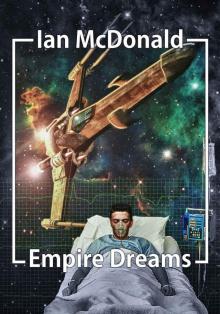 Empire Dreams
Empire Dreams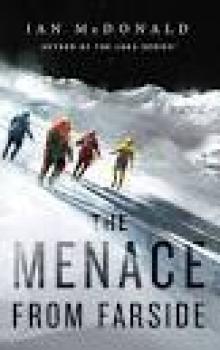 The Menace from Farside
The Menace from Farside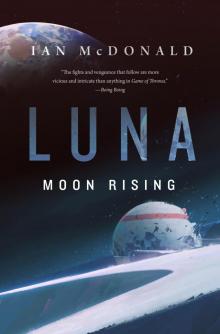 Luna: Moon Rising
Luna: Moon Rising Moon Rising
Moon Rising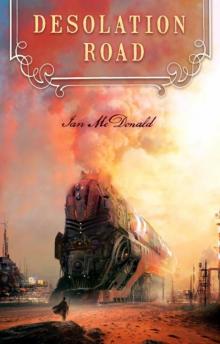 Desolation Road dru-1
Desolation Road dru-1 Empress of the Sun
Empress of the Sun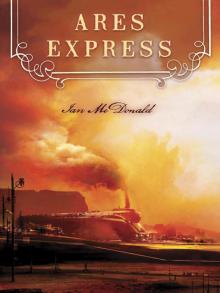 Ares Express dru-2
Ares Express dru-2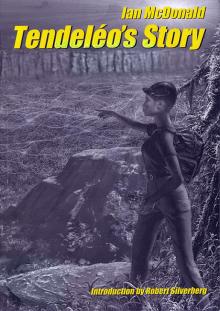 Tendeléo’s Story
Tendeléo’s Story River Of Gods
River Of Gods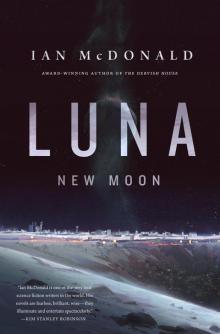 Luna
Luna![Cyberabad Days - [River of Gods 02] Read online](http://i1.bookreadfree.com/i1/03/29/cyberabad_days_-_river_of_gods_02_preview.jpg) Cyberabad Days - [River of Gods 02]
Cyberabad Days - [River of Gods 02]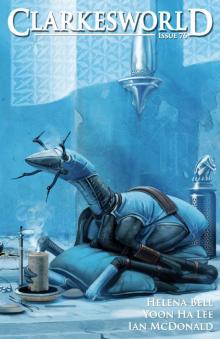 Clarkesworld Magazine Issue 76
Clarkesworld Magazine Issue 76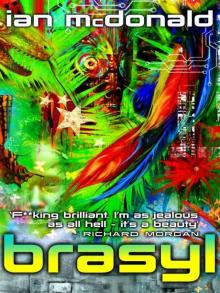 Brasyl (GollanczF.)
Brasyl (GollanczF.)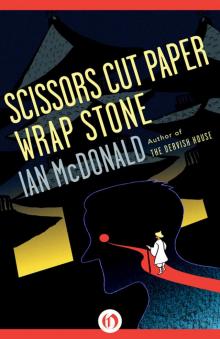 Scissors Cut Paper Wrap Stone
Scissors Cut Paper Wrap Stone Chaga
Chaga Time Was
Time Was Cyberabad Days
Cyberabad Days Be My Enemy
Be My Enemy Changa
Changa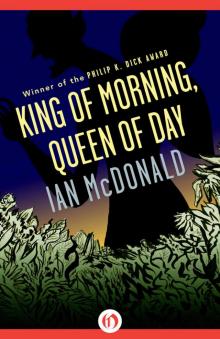 King of Morning, Queen of Day
King of Morning, Queen of Day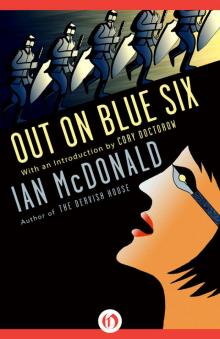 Out on Blue Six
Out on Blue Six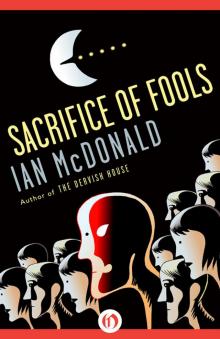 Sacrifice of Fools
Sacrifice of Fools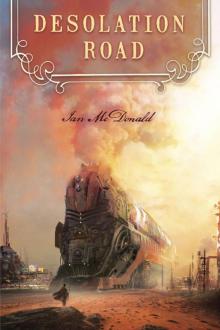 Desolation Road
Desolation Road Luna--Wolf Moon--A Novel
Luna--Wolf Moon--A Novel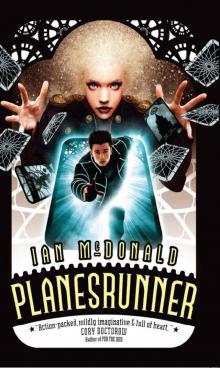 Planesrunner (Everness Book One)
Planesrunner (Everness Book One) Ares Express
Ares Express